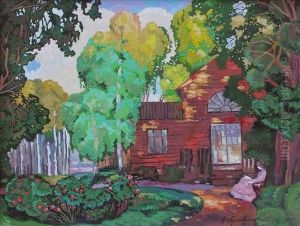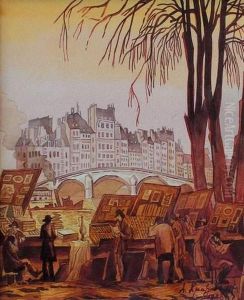Alexei Illitch Kravtchenko Paintings
Alexei Illitch Kravtchenko was a Russian artist known primarily for his work as a graphic artist, illustrator, and stage designer. Born on February 3, 1889, in Kostroma, Russia, he lived through a period of significant historical change, experiencing both the decline of the Russian Empire and the rise of the Soviet Union.
Kravtchenko trained at the Moscow School of Painting, Sculpture and Architecture, where he was influenced by the prevailing styles of the time, including Art Nouveau and later Constructivism. His early works were marked by a strong sense of design and often included elements of Russian folklore.
As a graphic artist, Kravtchenko is best remembered for his woodcuts and illustrations. He developed a distinct style that was characterized by bold, expressive lines and a dramatic use of light and shadow, which he applied to various subjects, from landscapes and everyday scenes to illustrations of literary works. His illustrations for books by Russian authors such as Leo Tolstoy and Anton Chekhov are particularly noteworthy.
Kravtchenko's career evolved amid the backdrop of the Russian Revolution and subsequent Civil War. Like many artists of his time, he navigated the shifting political landscape, which eventually led to the establishment of the Soviet Union. Under the new regime, artists were expected to adhere to Socialist Realism, and Kravtchenko's work, like that of many of his contemporaries, was influenced by these ideological demands. Nevertheless, he managed to retain a degree of personal expression in his work.
During the 1920s and 1930s, Kravtchenko also became involved in stage design, creating sets and costumes for various theaters in Moscow. His work in this area was marked by the same strong graphic sensibility that characterized his illustrations.
Tragically, Alexei Illitch Kravtchenko's life and career were cut short when he died on June 11, 1940. Despite the relatively brief span of his career, he left a lasting impact on Russian graphic art and illustration, and his works are still admired for their originality and expressive power.

